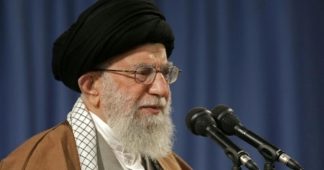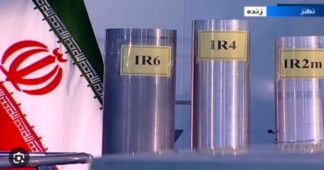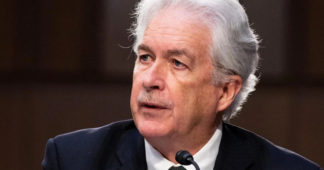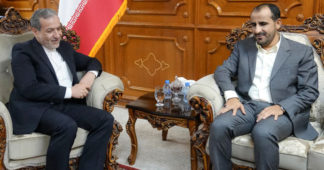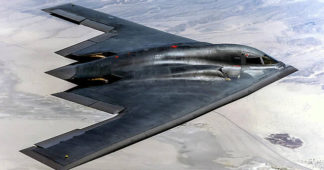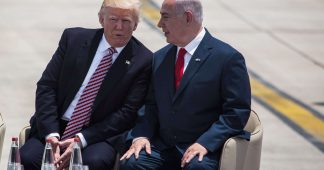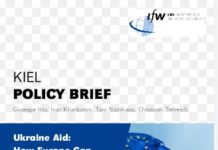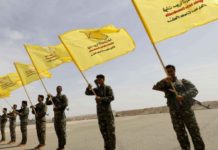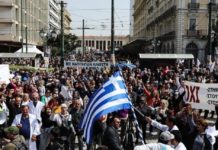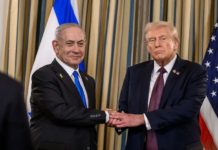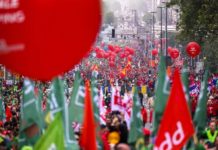by Max Blumenthal·
May 21, 2025
In Tehran, bewildered diplomats told me they suspect the Trump administration is exploiting nuclear negotiations as a instrument for generating instability to weaken Iran’s economy and foment social strife
With nuclear negotiations between the Trump administration and Iran’s Reformist government at a standstill, I held two separate, lengthy background conversations in Tehran this past week with a pair of seasoned Iranian diplomats with detailed knowledge of the talks in Muscat, Oman.
Like most Iranians, the diplomats were eager for a durable deal that would provide sanctions relief. But they said their side could not seem to break through to a Trump team they described as dithering, divided, distracted by other conflicts, and incapable of holding to a consistent position. Worse, as the negotiations drag on, the Trump administration is defaulting toward the hardline Israeli position which rejects all uranium enrichment, even for civilian purposes, violating a right Tehran considers sacrosanct.
The Iranian diplomats have now begun to suspect the Trump administration held an ulterior motive for engaging in talks, and is exploiting the meetings in Oman as a instrument for generating instability to weaken Iran’s economy and foment social strife.
Their comments to me echoed a warning issued by the Leader of Iran’s Islamic Republic, Ayatollah Khamenei, as Tehran considered a request from Trump for nuclear talks last March. “Negotiating with this US administration won’t result in the sanctions being removed,” Khamenei declared. “It will cause the knot of sanctions to become tighter and pressure to increase.”
Following two months of political confusion and a significant escalation of US financial warfare, the Ayatollah’s words have proven prescient. Iran’s Reformist government now risks repeating the folly of the 2015 Joint Comprehensive Plan Of Action, or JCPOA, which failed to deliver meaningful sanctions relief in the brief period before Trump shredded the deal, and ultimately led to a regime of “maximum pressure” culminating with the US assassination of Iranian Maj. Gen. Qasem Soleimani.
Iran’s government entered the latest round of talks under heavy pressure, with Trump dispatching a B-2 bomber strike force to the Diego Garcia Airbase to enforce his demands. The negotiations also took place in the shadow of the post-October 7 wars, in which Iran’s regional allies had suffered serious setbacks and with the last retaliation it vowed against Israel, True Promise III, still unfulfilled. Iranian public opinion researcher Ebrahim Moehseni told me his polling at the time showed that a majority of Iranians from all social sectors supported the talks.
According to the two diplomats I spoke to in Tehran, Iran’s negotiating team arrived in Oman with a sense of pessimism, but quickly grew more positive as they realized the Americans were not introducing demands for Iran to sever relations with its allies in Lebanon and Yemen, scrap its long range ballistic missiles, or destroy its reactors in Natanz and Fordow. But after each encouraging exchange, they watched key Trump negotiators issue bellicose statements to media immediately after returning to Washington, essentially reversing the positions they had taken in Muscat. The Iranians suspected Trump’s team, led by real estate lawyer Steve Witkoff, was kowtowing to Israeli assets like the Foundation for the Defense of Democracies and its top donor, Miriam Adelson.
During each round of talks, the Iranian team introduced concrete proposals to bridge disagreements and maintain momentum. But according to the diplomats I spoke to, they found themselves waiting for a week or more to receive a reply from the Americans. They described Witkoff as distracted by other diplomatic assignments and said he often put Iran on the back burner while he tended to Ukraine-Russia negotiations or the Gaza war.
The diplomats were especially concerned by the apparent power struggle between Witkoff and Secretary of State Marco Rubio. They suspected that Rubio was exploiting US media appearances to project control over the negotiations, and worried that his apparent rivalry with Witkoff would prevent Trump’s team from reaching a consensus on the nuclear issue.
One Iranian diplomat referenced historian Robert Dallek’s book, The American Style of Foreign Policy, to elucidate his view that the Trump administration’s counter-productive approach reflected a deeper crisis in the US establishment. The 1983 book argued that domestic pressures and social shifts at home have placed US foreign policy makers on a persistently irrational trajectory. The diplomat pointed to former Secretary of State Tony Blinken as a case study in Dallek’s thesis, recalling how Blinken routinely moved the goalposts on previous agreements with Iran in order to prevent negotiations from taking concrete form during the Biden years. His implication, as I read it, was the preponderance of pressure from the Israel lobby and military industry had been too overwhelming to allow either the Biden or Trump administration to execute a lasting deal.
Both diplomats I spoke to brought up recent reports revealing that Witkoff had promised Hamas he would force Israel to lift the starvation siege on the Gaza Strip if they released the US-Israeli captive Edan Alexander. They were dismayed that Witkoff had reneged on his promise and allowed Israel to slaughter hundreds of civilians in an apocalyptic frenzy throughout the week. Trump’s bad faith tactics with Hamas have cast a pall over the negotiations in Oman, fueling Iranian pessimism about a workable deal.
But perhaps no statement was more damaging to the prospect of a deal than Witkoff’s proclamation on ABC’s ‘This Week’: “We have one very, very clear red line, and that is enrichment. We cannot allow even 1% of an enrichment capability.”
The comments fit the pattern of Trump negotiators sabotaging progress in Oman by issuing onerous demands and threats immediately after returning to Washington. And few issues are more central to the Islamic Republic’s sense of independence than its civilian nuclear program.
A tour of Tehran’s nuclear reactor illustrates the ‘battle of wills’
While in Tehran, Iran’s Atomic Energy Organization of Iran (AEOI) invited me and a small group of journalists and academics to tour the city’s Nuclear Research Center, an active reactor originally constructed with US assistance under the Shah.
Once inside the vast facility (without our phones, as recording devices were strictly forbidden), we were treated to an exhibition touting the many lifesaving products of Iran’s nuclear program, from advancements in radiotherapy to the production of anti-cancer drugs to the sterilization of medical devices and protection of agriculture.
The visit was clearly designed to illustrate the importance of nuclear energy to Iran’s national development, and the absolute commitment of its leadership to continuing the project despite the continuous threat of assassination, sabotage and all-out war.
Following our tour, we met with Beyrouz Kamalvandi, a veteran Iranian diplomat now serving as spokesman for the AEOI. Like the other Iranian diplomats I spoke to, Kamalvandi volunteered his country’s desire to abide by all its obligations under the Non-Proliferation Treaty. But he viewed Iran’s civilian nuclear program as the key to consolidating its technological edge, and an absolute right under international law.
“They want to do with us what they did with Gaza, where the entire society is besieged,” Kamalvandi proclaimed. “But we have a great civilization, and it’s only a matter of time before they realize we won’t submit. This is not just a battle over enrichment, it’s a battle of wills.”
At one point during the meeting, Kamalvandi pointed to a young man seated in the back row of the conference room, asked him to stand, and identified him as the son of the Iranian quantum field theorist Massoud Ali-Mohammadi, who was assassinated by a Mossad asset in 2010. Ten years later, Iran lost the godfather of its nuclear program, Mohsen Fakrizadeh, when the Mossad smuggled a machine gun drone into the country and stationed it along a road to attack Fakrizadeh’s convoy. Kamalvandi, for his part, was injured and hospitalized in 2021 while inspecting a part of the Natanz reactor that had been damaged by an Israeli attack.
In the eyes of Iran’s leadership, Witkoff’s demand to end enrichment was not only a recipe for squandering decades of technological advancement, it was an insult to the top tier scientists cut down by Israeli assassins. If this is the new baseline for a deal, negotiations are an exercise in futility. And yet the show goes on.
Economic sabotage behind the guise of negotiations
Since negotiations began, the value of the Iranian rial has fluctuated wildly against the dollar, improving in value after the first round of positive exchanges, then depreciating following each wave of bellicose threats from Trump and his team. I personally witnessed Iran’s financial chaos each time I attempted to exchange dollars for rials, as business owners consulted their phones for the new rate, which seemed to shift from day to day depending on the US president’s rhetoric. A friend joked that I would have paid a substantially lower rate to book a hotel room for my family if negotiations were not currently taking place.
Trump’s statements about the negotiations have also roiled oil markets. On May 16, when Trump claimed he was “getting close to maybe a deal” with Iran, the price of oil plummeted by 3.4%. Then came Witkoff’s call to cease enrichment, and on May 20, US intelligence leaked a warning that Israel was planning to attack Iran’s oil facilities, causing a sudden surge in oil prices.
The American president’s ability to manipulate financial markets both inside and outside Iran with his bluster has contributed to a sense that entering the negotiations have weakened Iran’s political position. Meanwhile, Trump’s crude insults to Iran’s sense of national honor and sovereignty have disrupted whatever goodwill existed when talks began.
The president’s announcement on May 7 that he was considering renaming the Persian Gulf to “the Arabian Gulf” fueled outrage across Iran — uniting everyone from pro-government principlists, to reformists, to pro-regime change monarchists in opposition to the insult to their national pride. Tehran responded with a billboard campaign condemning the change and a lawsuit against Google for abiding by the name change on its Maps applications.
Trump’s speech in Riyadh deepened the enmity, as he attempted to pit the Iranian public against its leadership, praising his unelected, monarchic hosts for supposedly having “turned dry deserts into fertile farmland,” while accusing Iran’s leaders of “turn[ing] green farmland into dry deserts, as their corrupt water mafia…causes droughts and empty riverbeds. They get rich, but they don’t let the people have any of it.”
Two days after Trump’s address in Riyadh, dust storms from the growing deserts of Saudi Arabia gusted into Iran, clouding the skies over Tehran and keeping many residents indoors. The irony did not escape those who heard Trump’s praise for the House of Saud’s supposed green miracle. Meanwhile, there is a growing sense that war clouds are gathering as well.
One well-connected Iranian academic in Tehran told me he expected his country to be on the receiving end of Israeli sabotage and confrontation throughout the summer. Both diplomats I spoke to insisted that in such a scenario, True Promise III was an option on the table.
We remind our readers that publication of articles on our site does not mean that we agree with what is written. Our policy is to publish anything which we consider of interest, so as to assist our readers in forming their opinions. Sometimes we even publish articles with which we totally disagree, since we believe it is important for our readers to be informed on as wide a spectrum of views as possible.
